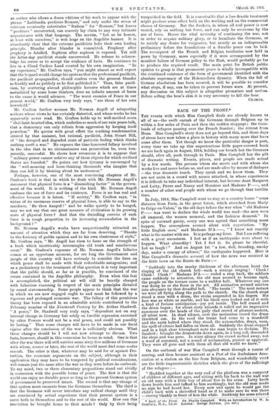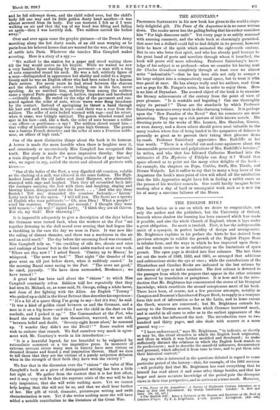BACK OF THE FRONT.*
Tax events with which Miss Campbell deals are already known to _ all of us—the swift onrush of the Germans through Belgium up to within a few miles of Paris and then the sudden stoppage ; the train- loads of refugees pouring over the French frontier ; the retreat from Mons. Miss Campbell's story does not go beyond this, and those days of stress have now taken a place in history with many more that have come after them. Yet though we know the particular danger is past, every time we take up this unpretentious little paper-covered book we are back again in August, 1914, holding our breath lest the Germans should, after all, push through to Paris. Miss Campbell has the gift of dramatic writing. Events, places, and people are made actual by a few words. The persons whom she meets and with whom she works live and move before us, and are made alive by means of dialogue —the true dramatic touch. 'They speak and we know them. They are not units in a crowd with names attached, in whose experiences it is difficult to take any individual interest, but become Aunt Margaret and Latty, Pierre and Nancy and Monsieur and Madame P—, and a number of other real people with whom we go through that terrible
time.
In July, 1914, Mis3 Campbell went to stay at a country house " some distance from Paris, in the great forest, which stretched from Manly to Crepy-en-Valois," in the old days before the war when " old Madame P— was wont to declare the whole world was mad—the men were all immoral, the women unmoral, and the fashions demoraL" In spite of outward gaiety, every one was agreed that something must
happen. The atmosphere seemed silent with expectation. My little English ones," said Madame D'A—, " I know not exactly what is the matter with me. It is perhaps my liver. But I am suffering with a great uneasiness. I feel as if an earthquake were about to happen. What absurdity I Yet I feel it. So please be cheerful. Let us laugh !" And on August 1st " a low, dull, brooding, smoky day, under a canopy of silence," the earthquake happened. Here is Miss Campbell's dramatic account of how the news was received in the little town on the Route de Paris :—
"Suddenly into the murky thickness of the afternoon burst the ringing of the old church bell—such a strange ringing ! Clank ! Clank 1 Clank !' Madame D'A— reeled a step back, the soldiers came suddenly to attention, the old man seemed to become rigid, the people on the terrace came to a sudden halt. Whatever any one was doing he or she froze in the act. All animation seemed smitten into abeyance by that dreadful bell. ' The tocsin !' The next instant we were all flying along the path to the church. On the church steps stood a man with a drum, the sticks suspended in his fingers. His face was as white as marble, and his black eyes looked out of it with a kind of furious anticipation—joy yet terror. The bell ceased and the drum began ; for about sixty seconds it rolled out its imperative summons over the heads of the gaily clad crowd of pleasure-seekers, all silent now. In dead silence, over the motionless crowd the drum throbbed out. In the road the trains had come to a standstill and the carts halted where they stood, the automobiles, drays, vans, - the spell of silence had fallen on them all. Suddenly the drum stopped and in a high clear triumphant note the man began to declaim. He finished ; brought the drumsticks down again, in a long roll, descended the steps and was gone. In utter silence the crowd melted away, not a word of comment, not a sound of acclamation, protest or approval. They were all gone and with them all that old world we knew."
On the outbreak of war Miss Campbell went through a course of nursing, and then became assistant at a 1308i of the Ambulance Asso- ciation at a station on the lino from Belgium, and wonderfully vivid are the little impressionistic sketches which she gives of the sufferings
of the refugees
" Huddled together at the very end of the platform was a company of children of different ages, and sitting with his back to the wall was an old man with a little boy of about five in his arms. Latty knelt down beside him and talked to him soothingly, but the .old man made no sign he had heard her. Every now and again he would pat the child's back with a shrivelled hand as if to make sure he was there —staring blankly in front of him the while. Suddenly his arms relaxed • Back of tits Front. By Phyllis Campbell. With as Introduction by W. L. Courtney, M.A., LL.D. London: George Newnes. lls. net.] and he fell sideways down, and the child rolled over, but the child's body fell one way and its little golden dusty head another—it was almost severed from its body. For one moment I felt as if I were walking on air and that the top of my head was lifting and falling on again—then I was horribly sick. Two soldiers carried the bodies away.
Over and over again come the graphic pictures—of the French Army marching along the hot dusty roads, of an old man weeping as he parte from his beloved horses that are wanted for the war, of the driving of cattle into Paris. Whatever she touches Miss Campbell makes arresting. Here is a story of a spy :—
" We walked to tha station for a paper and stood waiting there till the boy would arrive on his bicycle. While we waited we saw a very familiar figure standing by the pavement—a man with a tray of nuts suspended round his neck. He was a tall, soldierly figure of s man—distinguished in appearance but shabby and soiled to a degree. Gossip said he was an English officer who had been ruined by a famous Paris actress. For seven years he had stood between the chateau and the church selling nuts—never looking one in the face, never speaking. As we watched him, suddenly from among the soldiers came a typical Paris gamin—ragged, hatless, impudent and barefooted —evidently drunk. He reeled on the edge of the pavement and can- noned against the seller of nuts, whose wares were flung broadcast by the contact. Instead of apologising he thrust a hand t
his hair and said something in argot—and there was a roar from the soldiers. The seller of nuts looked wizened with rage—and his retort, when it came, was bitingly satirical. The gamin wheeled round and spat in his face—and, like a flash, the seller of nuts became a soldier —an officer—a gentleman—a spy ! The soldiers closed round him— that .volley of horrible cursings was in pure high German. The gamin was a famous French detective and the seller of nuts a Prussian noble- man, an officer of high rank."
One of the most distinctive things about the book is its humour. A horror is made the more horrible when there is laughter near it, and consciously or unconsciously Miss Campbell has recognized this truth. Her story is made the more impressive thereby. One day
a train disgorged on the Post " a hurtling avalanche of gay tartans," who, we regret to say, raided the stores and silenced all protests with. kisses :- ' One of the ladies of the Post, a very dignified old countess, voluble as the clacking of a mill, was silenced in the same fashion. The High- landers kissed all the old ladies and Aunt Margaret, who alternately stamped with rage and laughed. Then they all scrambled back into the carriages carrying the loot with them and laughing, singing and blowing kisses, disappeared into the forest. . . . And who are these Scotch ? Tell me,' demanded the countess furiously.—' Listen.' Latty took her by the apron. ' I will tell you. The Scots are a species of English who wear petticoats.'—' Oh, mon Dieu! What a people ! ' cried the countess. Petticoats, par exemple I I thought they were wild women.'—' Ah well ! ' sighed Latty. ' I think they are all thieves. But oh, my God ! How charming ! "
It is impossible adequately to give a description of the days before the Germans were turned back, when the workers at the Post " sat together listening to the dull sound ever nearing that had begun like a throbbing in the ears the day we were in Paris. It was now like
the rolling of distant thunder, and there was a smokiness in the air and an acrid smell." The day before the oncoming flood was stemmed, Miss Campbell• tells us, " the crackling of rifle fire, shouts and cries
and millings of horses' feet in the forest aisles reached us at our work. ' Where are they now ? ' I asked Raoul. Coming up to Meaux,' he whispered. ' The news are bad.' " That night " the thunder of the guns went on till just before dawn, when it suddenly ceased." In the morning Raoul came racing to the Post. " The news are good," ho cried, joyously. " We have them surrounded, Mesdames ; we
have turned ! "
A great 'deal has been said about the " visions " .to which Miss Campbell constantly refers. Sokliera told her repeatedly that they bad seen. St. Michael, or, .as some said, St. George, riding a. white horse, and Joan of Arc fighting with the Allies. An English " Tommy " who picked up a child in the Great Retreat thus describes his experience : " ' It's a bit, of a queer thing Pm going to say—but it's true,' he said.
'It was a kind of golden cloud between us and the Germane, and a man in it on a big horse—and then I saw the child in the dust on the roadside, and I picked it up.' " The Commandant at the Post, who heard the stories from the men themselves, wavered, we are told, " between belief and doubt. Seventy-eight hours afoot,' he summed np. ' I wonder they didn't see the Devil ' " Some readers will wish to endorse that remark. We find ourselves very much in agree- ment with Mr. Courtney's words in his introduction :—
" It is a beautiful legend, far too beautiful to be vulgarised by rationalistic comment or, a too inquisitive press. In moments of extreme nervous, stress many men in history have seen visions or dreamed dreams and found a real inspiration therein. Shall we dare to tell them that they are the victims of a purely subjective delusion 'when in the strength of their faith they have won the victory ? "
We fear that in the discussion over the " visions " the value of Miss Campbell's book as a piece of distinguished writing has been a little lost sight of. We gather from the context that it is her first effort, and it may very well be that the supreme crisis of the war will be her
only inspiration, that she will write nothing more. Yet we cannot help hoping that this will not be so, and that we shall hear further of her. Her gift of vivid, dramatic, picturesque writing and swift characterization is rare. Yet if she writes nothing more she will have added a notable contribution to the literature of the Great War, •



























 Previous page
Previous page